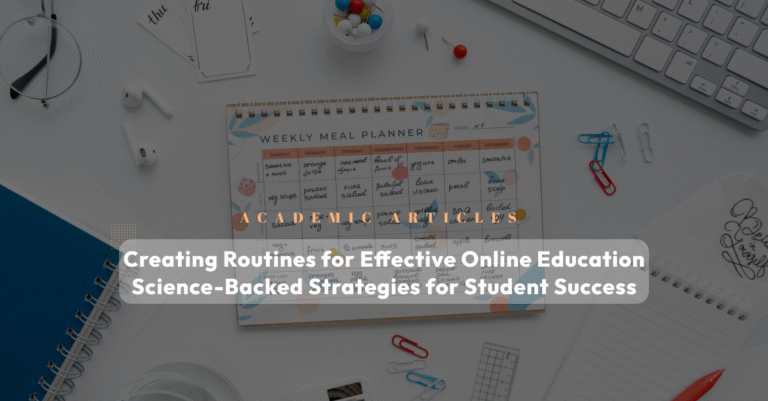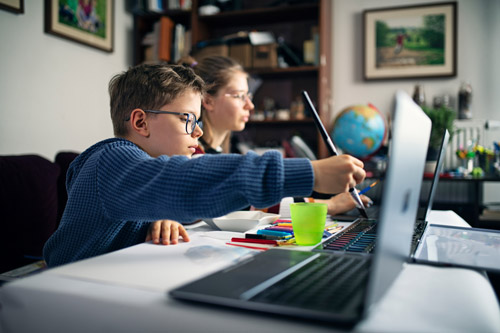Consistency is the cornerstone of success, regardless of whether we talk about academic or professional life.
While digital classrooms offer flexibility and freedom, that same flexibility can easily become a double-edged sword when students lack structured routines.
Establishing positive learning habits isn’t just good advice—it’s rooted in behavioral science.
Why Routines Matter in Remote Learning
Children thrive on predictability. According to developmental psychologists, routines provide a sense of security, promote emotional regulation, and enhance focus.
In online learning, where the environment lacks physical cues of a traditional classroom, routines serve as behavioral anchors that help students transition into “learning mode.”
Research in behavioral economics and cognitive psychology emphasizes the power of habit loops—a cycle of cue, routine, and reward.
By embedding educational habits within these loops, parents and educators can support long-term academic engagement.
Set Clear Cues: Start the Day the Same Way
Cues are powerful psychological signals.
In physical schools, cues are everywhere: the school bell, the morning announcements, and the classroom environments.
At home, these must be intentionally created.
Tips:
- Begin the day with a consistent activity, such as a short mindfulness exercise, stretching, or reading a motivational quote.
- Dress for learning. While full uniforms aren’t necessary, changing out of pajamas helps mentally separate school from leisure.
Design a Fixed Daily Schedule
The brain loves rhythm. A fixed schedule helps students anticipate what comes next, reducing decision fatigue and resistance.
Tips:
- Use time blocks: Study, break, lunch, outdoor time, and creative activities.
- Balance structure with flexibility. For example, allow freedom of subject choice within fixed learning hours.
- Include buffer time between lessons to prevent burnout and screen fatigue.
Create a Dedicated Learning Space

Environmental psychology shows that context influences behavior.
A clutter-free, quiet, and tech-equipped space sends a subconscious signal: this is where learning happens.
Tips:
- Avoid beds and couches—associate those with rest.
- Use minimalistic setups: desk, chair, good lighting, and school supplies.
- Personalize the space with motivational quotes or a learning goal chart.
Use Habit Stacking to Encourage Productivity
Coined by author James Clear, “habit stacking” involves pairing a new behavior with an already established one.
For instance, “After I finish breakfast, I open my online dashboard.”
Examples:
- After brushing teeth → 10 minutes of review.
- After lunch → read one chapter from a book.
- After logging into the platform → write today’s to-do list.
This method leverages existing neural pathways, making it easier to adopt new habits.
Reinforce with Positive Feedback Loops
Behavioral reinforcement is a classic psychological strategy.
Students receiving quick, positive feedback for completing tasks strengthen their motivation and persistence.
Tips:
- Use visual progress charts or reward systems (digital badges, praise, small treats).
- Celebrate small wins, like finishing a tough subject or improving a test score.
- Incorporate self-assessment so students can monitor their own growth.
Involve the Whole Family
Social reinforcement plays a vital role in habit formation. Parents and caregivers should be actively involved—not just as monitors, but as role models and cheerleaders.
Tips:
- Create a shared calendar with study times, breaks, and family activities.
- Check in daily with open-ended questions like, “What was something new you learned today?”
- Set a family goal related to learning, like reading a book series together.
Prepare for Transitions and Breaks
Students often struggle most during transitions, such as starting or stopping a task, switching subjects, or ending the school day. Routines should soften these moments, too.
Tips:
- Use alarms, timers, or music transitions to signal break times.
- Create “start-up” and “shutdown” rituals to open and close the school day.
Final Thoughts: Routines Build Autonomy
While online education empowers students with independence, structured habits help them use it wisely.
Effective routines reduce stress, increase focus, and build lifelong skills in time management and self-motivation.
By applying insights from behavioral science—such as habit formation, environmental cues, and positive reinforcement—parents and educators can turn remote learning into a consistent, empowering, and productive experience.
Share, Discuss, or Ask
Do you have a child in an online school, or are you considering enrolling your child in one? We’d love to hear about your experiences. Let us know what has been or may be decisive in the dilemma of Traditional vs. Online.
If you have questions, please visit us at EduWW or email [email protected].



